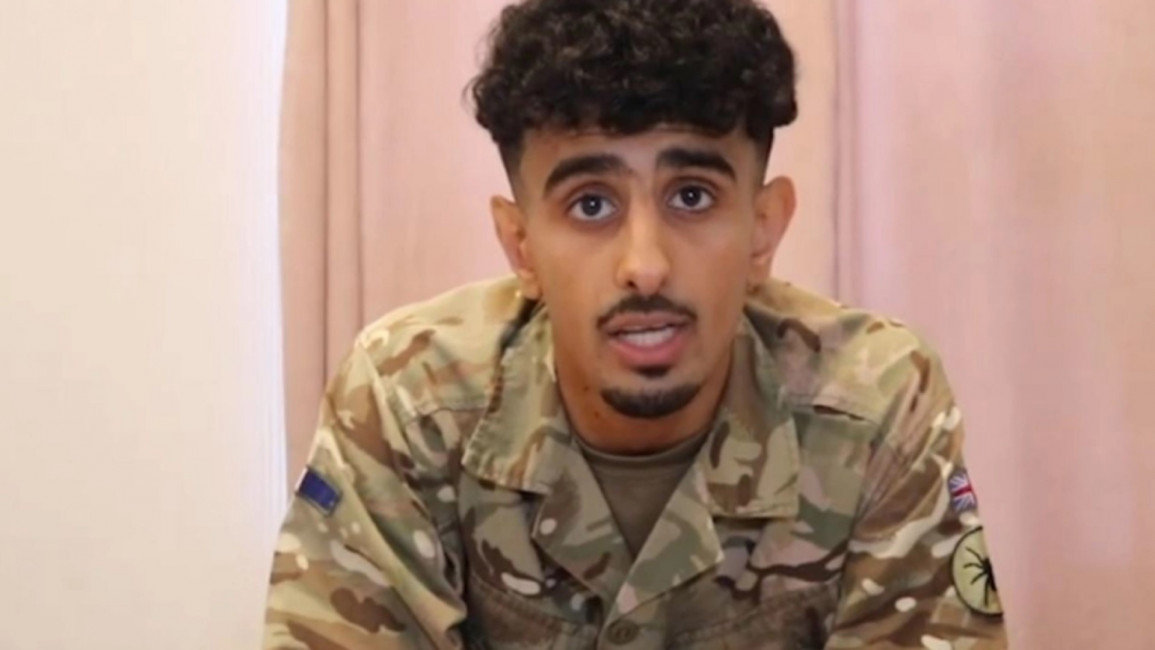
Muslim-British soldier's refusal to serve over UK-backed Yemen war is a heroic cry of conscience
When British soldier Ahmad al-Babati (alternatively al-Batati) recently protested in a widely circulated video the complicity of the British government in the ongoing Saudi-led war on Yemen, the response by Whitehall was unsurprising. Similar to the government's approach of total silence towards the death and destruction in Yemen that their arms, military training and 'special relationships' are facilitating, the immediate action against al-Babati was to censor his justified anger and lock him up.
The 22-year-old, who had enlisted in 2017, was arrested by Royal Military Police outside Downing Street where he made a stand against the alleged war crimes being committed in Yemen. He vowed to not serve as long as the UK continues its arms deals with Saudi Arabia, stating: "I've made this decision based on the lack of consideration of our government towards the people of Yemen."
Often referred to as the largest humanitarian crisis in recent history, with over 100,000 people killed, as well as schools, hospitals and homes destroyed, the war in Yemen has been catastrophic and its impacts are likely to continue long after the guns fall silent.
Since 2015, the UK has licensed over £6 billion worth of arms to Saudi Arabia. The Campaign Against the Arms Trade (CAAT) highlighted this alarming information, and even took the British government to court over the unlawful selling of arms to Saudi Arabia which have been used on civilians.
CAAT won and managed to halt arms sales to Saudi Arabia and other nations complicit in the war in Yemen. Yet, even the legal confirmation of the barbaric targeting of the Yemeni people hasn't stopped the British government in their continued collaboration with the attacks. They have since returned to the selling of arms to Saudi.
 |
When it comes to the crimes against the Yemeni people, the evidence is overwhelming but those accountable prefer to criminalise the very voices that are pointing this out. |  |
Not the first time
When it comes to the crimes against the Yemeni people, the evidence is overwhelming but those accountable prefer to criminalise the very voices that are pointing this out.
|
The case of al-Babati is not the first and it may not be the last. Many still remember the imprisonment of Joe Glenton, who had refused to continue serving in Afghanistan. The former army veteran was posted in southern Afghanistan in 2006 where, in his own words, he was expected to participate in "unleash[ing] a violent, illegitimate military occupation that would play out for years".
As the reality set in over the intervention which was so often spun as a saviour mission by western nations in order to bring democracy to Afghanistan and 'liberate' Afghan women, Glenton turned into a vocal opponent of the war. He soon became a prominent anti-war figure, which he paid for with months spent in military prison.
Forward a few years and leaked documents to The Sunday Times brought to light that British soldiers may have committed war crimes in Afghanistan as well as Iraq. These included torture and sexual assault, which the British Army has allegedly been covering up.
What was highlighted repeatedly by all these soldiers, dubbed as having gone rogue, is the simple truth that these wars and military crusades do not spread freedom and liberation but death and destruction. The British government has demonstrated that it will do everything necessary to silence and bury such information from becoming widely circulated. In fact, the Tories recently attempted to push through the Oversees Operations Bill in order to further reduce the accountability of the armed forces by increasing the impunity of serving soldiers abroad.
Glenton wrote that for him, enlisting in such an institution was effectively pledging "to play lackey to the violent, rapacious ambitions of the UK establishment by becoming a soldier in the British army." The role of British forces is far from apolitical, yet those who serve are informed of their contractual obligations towards presenting themselves as such, with strict expectations whilst in uniform, for example. These do not appear to apply to taking collective pictures with Tommy Robinson, one of the most renowned far-right figures in the UK.
 |
|
| [Click to enlarge] |
Bad apples or vanguards of racist campaigns?
In reality, Glenton's description of the British army is apt. Soldiers are [literally] the armed vanguard of Britain's most violent campaigns waged against poor and racialised people around the world. So often the reaction to the heinous acts of soldiers deployed abroad, is to designate them as bad apples, but the British Army must always be analysed and held accountable as an institution. The class dynamics have long enabled politicians to demonise young working class men as having acted alone, as though their policies, their commands and expectations have not created the perfect environment and psychological state for violence to flow and be meted out.
Al-Babati's protest shines a light on exactly this institutional character of the military machine because he has directed his demands directly to the top: Number 10 Downing Street.
As the great Muhammad Ali declared when he refused his conscription into the US army in the late 60s, which would have led him to serve in Vietnam: "The real enemy of my people is here. I will not disgrace my religion, my people or myself by becoming a tool to enslave those who are fighting for their own justice, freedom and equality."
Al-Babati too has turned his ire towards the enemy at home and he is already paying the price for it.
The work that has long been done by groups such as the former soldiers who set up Veterans for Peace UK, anti-war campaigners, victims of military violence and imperialist wars who continue to fight for justice is crucial, though unimaginably difficult as it comes with push-back from the highest levels.
Al-Babati's action demonstrates how urgent it is for unions, community groups, and others to join in. Our state is enabling the massacre of the Yemeni people. But our collective actions can force them to stop.
Malia Bouattia is an activist, a former president of the National Union of Students, and co-founder of the Students not Suspects/Educators not Informants Network.
Follow her on Twitter: @MaliaBouattia
Have questions or comments? Email us at: editorial-english@alaraby.co.uk
Opinions expressed in this article remain those of the author and do not necessarily represent those of The New Arab, its editorial board or staff.




